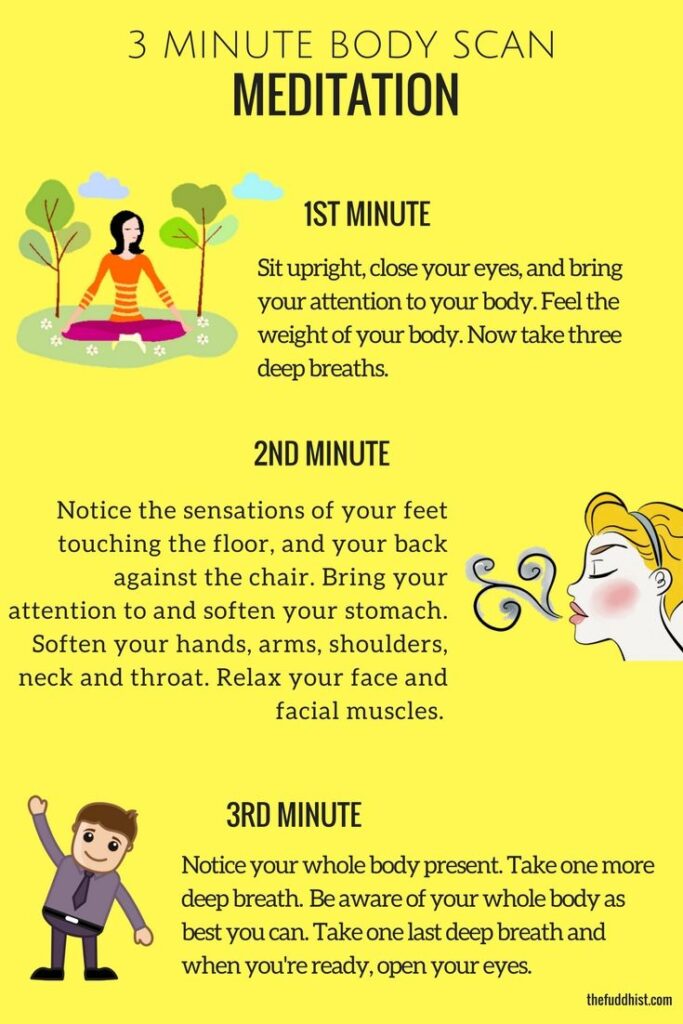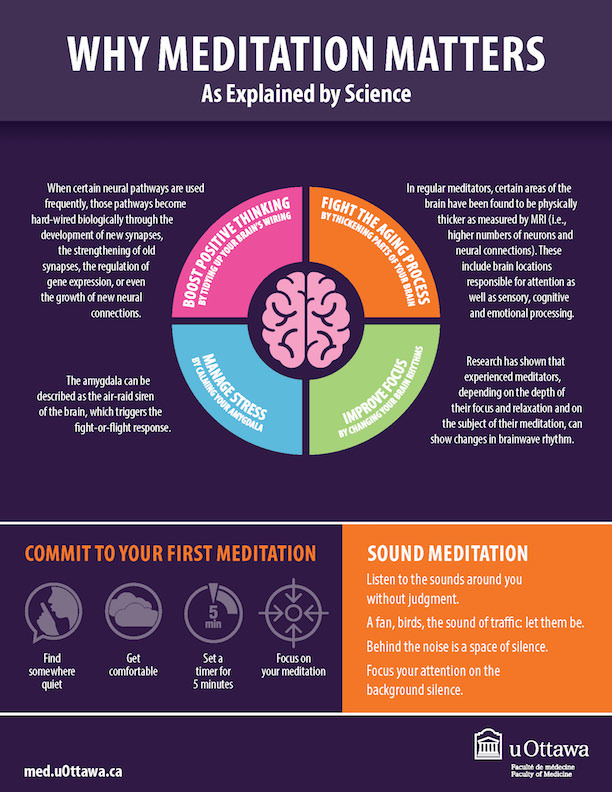Unlocking Academic Excellence: The Power of Mindfulness
What if the secret to scoring higher grades wasn’t in late-night study marathons or obsessing over textbooks, but in something as simple as taking a deep breath?
Research suggests that even a few minutes of daily mindfulness can significantly impact a student’s focus, memory, and overall academic performance. A study from Harvard University found that mindfulness meditation can physically change brain structures linked to learning and memory, in just eight weeks — and that’s with as little as 27 minutes per day.
But what if just 3 minutes could make a difference?
In an age where distractions are constant and student anxiety is skyrocketing — particularly post-pandemic — mindfulness has emerged as more than just a wellness buzzword. From Ivy League campuses to high-performing high schools, mindfulness practices are becoming part of the daily routines of top students, helping them stay calm under pressure and better manage their time and emotions.
According to Edutopia, integrating brief mindfulness exercises in classrooms has led to measurable improvements in attention and emotional regulation.
Mindfulness, at its core, means paying attention to the present moment without judgment. It’s a practice with roots in ancient meditation traditions, but today it’s used by elite athletes, CEOs, and increasingly, high-performing students.
With tools like Headspace and Calm, it’s easier than ever to integrate mindfulness into one’s study routine — no incense or yoga mats required. The question isn’t whether mindfulness works, but how to make it simple and accessible. The answer? Just 3 minutes a day.
The Science Behind Mindfulness
Mindfulness, simply put, is the practice of intentionally focusing your attention on the present moment in a non-judgmental way. This practice has been extensively studied in recent years, revealing profound effects on brain function and mental health.
According to The American Psychological Association (APA), mindfulness meditation activates the prefrontal cortex, the area responsible for decision-making, attention, and self-regulation, while reducing activity in the amygdala, which governs fear and stress responses. This neurological shift helps students manage anxiety and improve concentration during high-pressure situations like exams.
Several studies highlight how mindfulness boosts cognitive functions critical for academic success.
A landmark UCLA study demonstrated that mindfulness training increased gray matter density in brain regions associated with learning and memory. Similarly, research published in the Journal of Educational Psychology found that students practicing mindfulness exhibited significantly better working memory capacity and sustained attention compared to control groups.
Moreover, mindfulness helps regulate emotions, which can be a game-changer for students battling exam stress or performance anxiety. The Mindful Schools Initiative reports that mindfulness interventions reduce cortisol levels—the hormone linked to stress—in adolescents, leading to calmer minds and better academic outcomes.
The National Institutes of Health (NIH) also supports these findings, emphasizing mindfulness as a non-pharmacological approach to improve mental resilience and reduce symptoms of anxiety and depression.
This growing body of evidence underlines why educators and psychologists alike advocate for mindfulness as a vital skill for students. It’s not just about relaxation; it’s about rewiring the brain to be more focused, emotionally balanced, and ready to absorb knowledge — even if it only takes a few minutes a day.
What Top Students Actually Do
When we look closely at the habits of top-performing students, one surprising pattern emerges: many incorporate mindfulness practices into their daily routines. According to research from The Guardian, high achievers don’t just rely on hours of study—they take strategic breaks to reset their focus and reduce stress.
For example, students at universities like Stanford and Yale often use mindfulness techniques to maintain clarity during their demanding schedules.
In interviews conducted by The New York Times, many top students credit short bursts of meditation or breathing exercises with helping them stay centered before exams or presentations.
These techniques don’t require hours of practice; even a brief moment of focused breathing or mindful observation can reduce anxiety and improve cognitive function. One student shared how she uses a 3-minute “mindful pause” before starting her study sessions, allowing her to calm a racing mind and prioritize tasks effectively.
The routines of successful students often include simple mindfulness exercises such as the “body scan” — a technique recommended by the University of Massachusetts Medical School’s Center for Mindfulness. This practice helps students become aware of physical tension and consciously release it, improving focus and relaxation.
Another common method is mindful walking, which involves paying full attention to the sensations of movement, breath, and surroundings. According to Psychology Today, this activity can clear mental clutter and boost creativity.
What’s most interesting is that top students don’t see mindfulness as an “extra” task but as an essential part of their study habit toolkit. It’s not about meditating for an hour; it’s about consistent, manageable moments—like 3 minutes—that train the brain to focus better, stay calm under pressure, and ultimately boost academic performance.

This infographic illustrates a simple 3-minute body scan meditation, guiding students through mindful breathing and bodily awareness. Such short mindfulness practices can enhance focus and reduce stress, key traits in the routine of top-performing students.
3-Minute Mindfulness Techniques for Students
Incorporating mindfulness into a busy student’s day doesn’t have to be complicated or time-consuming. In fact, many effective mindfulness exercises can be done in just three minutes, making them ideal for quick mental resets between study sessions or before exams.
According to Mindful.org, these short exercises are designed to cultivate focus, calm, and awareness without requiring extensive meditation experience.
One of the simplest and most effective techniques is box breathing, also known as four-square breathing. This involves inhaling for four seconds, holding the breath for four seconds, exhaling for four seconds, and pausing for four seconds before repeating. The Navy SEALs use this method to stay calm under pressure, and it’s equally powerful for students to manage exam anxiety or improve concentration during study.
Another popular method is the 5-4-3-2-1 grounding exercise, a sensory awareness practice that anchors you in the present moment. As described by Verywell Mind, you mentally note five things you can see, four things you can touch, three sounds you can hear, two smells you can detect, and one taste.
This quick exercise helps interrupt racing thoughts and reduce stress, especially useful before tests or presentations.
For students who enjoy writing, mindful journaling can be a powerful way to clear mental clutter and boost gratitude. Apps like Day One or prompts from Greater Good Science Center encourage brief reflections such as “What is one thing I’m grateful for today?” or “What challenge did I overcome?” Taking just three minutes to jot down positive thoughts can improve mood and motivation.
Finally, mindful listening involves focusing fully on a short piece of music or natural sounds without distraction. Platforms like Calm and Insight Timer offer curated 3-minute soundscapes designed to enhance relaxation and attention.
Listening mindfully can rejuvenate your brain during study breaks and improve overall mental clarity.
By integrating these simple 3-minute mindfulness techniques into daily routines, students can experience noticeable improvements in focus, emotional regulation, and academic performance — all without the need for lengthy meditation sessions.
The Link Between Mindfulness and Academic Success
The connection between mindfulness and improved academic performance is supported by a growing body of scientific research and practical evidence. When students practice mindfulness, they develop stronger emotional regulation skills, which can reduce the debilitating effects of stress and anxiety on learning.
According to a meta-analysis published in the Journal of Educational Psychology, mindfulness interventions consistently lead to better attention control, working memory, and overall academic achievement in students of all ages.
Stress reduction plays a crucial role in this link. Chronic stress impairs the brain’s ability to encode and retrieve information, which negatively impacts test scores and learning efficiency.
The American Institute of Stress explains that mindfulness lowers levels of cortisol, the hormone associated with stress, allowing students to maintain cognitive function under pressure. A calmer mind translates to sharper focus and greater mental stamina, essential qualities for tackling challenging subjects or lengthy exams.
Educators and psychologists also highlight the role mindfulness plays in fostering resilience—the ability to bounce back from setbacks and maintain motivation. The Child Mind Institute notes that students who engage in regular mindfulness practice show increased patience, better impulse control, and enhanced problem-solving skills, all of which contribute to academic success.
These emotional benefits encourage students to approach learning with a growth mindset, embracing challenges rather than fearing failure.
Several case studies further illustrate the impact of mindfulness on academic performance. For example, a study at the University of Washington found that students who participated in a mindfulness-based stress reduction program experienced improved grades and lower test anxiety compared to their peers. This evidence suggests that even short, consistent mindfulness practice—such as the 3-minute routines discussed earlier—can create meaningful changes in student outcomes.
In sum, mindfulness not only calms the mind but actively enhances the cognitive and emotional skills necessary for academic achievement. By cultivating focus, reducing stress, and building resilience, mindfulness empowers students to perform at their best — proving that the mind’s state is just as important as the time spent studying.
Mindfulness in Schools and Universities
As the benefits of mindfulness become increasingly clear, more schools and universities worldwide are incorporating mindfulness programs into their curriculam to support student well-being and academic success. Initiatives like the MindUP Program have been widely adopted in classrooms, teaching students mindfulness skills alongside social-emotional learning.
Research published by Edutopia shows that schools implementing such programs see reduced behavioral problems, increased student engagement, and improved academic performance.
Higher education institutions are also embracing mindfulness. For example, Harvard University offers mindfulness courses and workshops aimed at helping students manage stress and sharpen their focus amid rigorous academic demands. Similarly, The University of Oxford’s Mindfulness Centre provides research-based mindfulness training that has been shown to reduce anxiety and enhance concentration in students.
Many educators report that mindfulness practices help create calmer classrooms and foster stronger teacher-student relationships. According to the Calm Schools Initiative, incorporating short mindfulness exercises during the school day helps students develop emotional regulation and resilience—skills essential not only for academic achievement but also for lifelong mental health.
In India, awareness about mindfulness in education is growing as well. Programs like Inner Space Foundation conduct workshops and training for students and teachers, aiming to integrate mindfulness into traditional education systems to improve focus and reduce exam stress.
By embedding mindfulness into the educational environment, schools and universities create a supportive space where students can thrive both academically and personally — making mindfulness a vital tool in modern education.

This infographic scientifically explains how meditation rewires the brain to boost focus, reduce stress, and enhance positive thinking. These cognitive benefits are key components of top students’ routines, helping them stay sharp and perform better academically.
Tips to Incorporate Mindfulness Into Your Study Routine
Incorporating mindfulness into your study routine doesn’t require drastic changes—small, consistent steps can make a significant difference. According to experts at Mindful.org, establishing a daily mindfulness practice begins with setting realistic goals, such as dedicating just a few minutes each day to mindfulness exercises.
Consistency, rather than duration, is key to reaping the benefits.
Start by creating a mindful study environment. Research published in the Journal of Environmental Psychology suggests that minimizing distractions and keeping your workspace organized can improve focus and reduce stress. Consider adding calming elements like plants or natural light, which have been shown to enhance concentration and well-being.
Before beginning a study session, try a quick 3-minute mindfulness exercise, such as deep breathing or body scanning, to clear your mind and prepare for focused work. Apps like Headspace and Calm offer guided meditations specifically designed to boost concentration and reduce anxiety, making it easy to incorporate mindfulness even during busy days.
Another helpful tip is to schedule mindfulness breaks during long study periods. The Pomodoro Technique — which involves studying for 25 minutes followed by a 5-minute break — pairs well with mindfulness.
Use your breaks for short mindful activities such as mindful walking or sensory grounding exercises, which help reset your attention and reduce mental fatigue.
Finally, cultivate a mindful attitude throughout your day by practicing gratitude and self-compassion. The Greater Good Science Center highlights that gratitude journaling can improve emotional well-being and motivation, while self-compassion practices help reduce the negative effects of academic pressure.
By weaving these simple mindfulness strategies into your study routine, you’ll create a sustainable practice that enhances focus, reduces stress, and ultimately helps you perform at your best academically.
Mindfulness: The Study Hack You Can’t Ignore
The evidence is clear: incorporating just a few minutes of mindfulness into daily study routines can profoundly enhance academic performance. As numerous studies from institutions like Harvard Medical School and the American Psychological Association show, mindfulness strengthens focus, reduces stress, and improves emotional regulation—key ingredients for success in any educational environment.
For students seeking to boost their marks without adding more hours to their study schedule, mindfulness offers a simple yet powerful solution.
Whether through brief breathing exercises, body scans, or mindful breaks, the consistent practice of being present can reshape how the brain handles information and stress, as highlighted by the UCLA Mindfulness Research Center. This means better concentration during lectures, clearer recall during exams, and a calmer, more resilient mindset overall.
Moreover, schools and universities worldwide are recognizing mindfulness’s role in nurturing well-rounded, high-achieving students by embedding these practices into their curricula and support services. Resources like the Mindfulness in Schools Project demonstrate the transformative impact mindfulness can have on educational outcomes and student well-being.
In conclusion, the secret routine of top students is not just hard work—it’s smart work that includes nurturing the mind through mindfulness. By dedicating just three mindful minutes a day, students can unlock a powerful tool to boost their marks, reduce anxiety, and cultivate lifelong skills for mental clarity and resilience.
FAQs About The Secret Routine of Top Students: How 3 Minutes of Mindfulness Can Boost Marks
What is mindfulness?
Mindfulness is the practice of paying attention to the present moment in a non-judgmental way, often through meditation or focused breathing.
How does mindfulness help students improve academically?
Mindfulness improves concentration, reduces stress, and enhances emotional regulation, all of which contribute to better academic performance.
Can mindfulness reduce exam anxiety?
Yes, mindfulness practices have been shown to lower cortisol levels and calm the nervous system, which helps reduce anxiety during exams.
How long do I need to practice mindfulness to see benefits?
Even short daily sessions of 3 to 5 minutes can lead to noticeable improvements in focus and stress management.
What are some simple mindfulness techniques for students?
Techniques like box breathing, the 5-4-3-2-1 grounding exercise, and mindful journaling are easy to practice and effective.
Is mindfulness only about meditation?
No, mindfulness includes any activity where you bring full attention to the present moment, such as mindful walking or mindful listening.
Can mindfulness improve memory?
Research indicates that mindfulness can increase gray matter density in brain regions associated with learning and memory.
Are mindfulness practices scientifically proven?
Yes, numerous studies from institutions like UCLA and Harvard confirm the cognitive and emotional benefits of mindfulness.
How can I incorporate mindfulness into a busy study schedule?
You can integrate brief mindfulness breaks between study sessions or practice quick breathing exercises before exams.
Do schools and universities support mindfulness training?
Many educational institutions worldwide have introduced mindfulness programs to enhance student well-being and academic success.
Can mindfulness help with motivation?
Yes, mindfulness promotes a growth mindset and emotional resilience, which can increase motivation to study and learn.
What apps are recommended for mindfulness practice?
Popular apps include Headspace, Calm, and Insight Timer, which offer guided meditations suitable for beginners.
Is mindfulness beneficial for students of all ages?
Absolutely, mindfulness practices can be adapted for children, teenagers, and adults to improve focus and reduce stress.
Can mindfulness help with sleep quality for students?
Yes, mindfulness techniques like body scanning and mindful breathing can promote relaxation and improve sleep.
Does mindfulness require a quiet place?
While a quiet environment helps, mindfulness can be practiced anywhere, even in noisy or busy settings, by focusing attention inward.
How often should I practice mindfulness?
Daily practice, even if brief, is recommended for sustained benefits in mental clarity and stress reduction.
Can mindfulness replace other stress management techniques?
Mindfulness complements other methods like exercise and counseling but should not replace professional mental health care when needed.
Is mindfulness suitable for people with anxiety disorders?
Mindfulness can be beneficial but should be practiced under guidance if you have severe anxiety or other mental health conditions.
How does mindfulness improve emotional regulation?
By increasing awareness of thoughts and feelings, mindfulness helps individuals respond thoughtfully rather than react impulsively.
What is the ‘secret routine’ of top students regarding mindfulness?
Many top students use brief mindfulness practices, such as 3-minute breathing exercises, to maintain focus and reduce stress before studying or exams.
-Authored By Pragna Chakraborty





